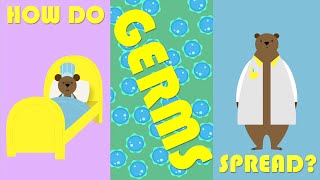(单词翻译:单击)
The sun is shining. The birds are singing.
太阳当空照,小鸟喳喳叫。
It looks like the start of another lovely day.
多么美好的一天又开始了。
You're walking happily in the park, when, 'Ah-choo!'
你在公园里高高兴兴地走着,直到“阿嚏”一声,
A passing stranger has expelled mucus and saliva from their mouth and nose.
路人甲从嘴和鼻子里喷出了黏液和口水。
You can feel the droplets of moisture land on your skin,
你能感觉到皮肤上有几许潮湿,
but what you can't feel are the thousands, or even millions,
但是你不会感觉到有成千上万的、
of microscopic germs that have covertly traveled through the air and onto your clothing, hands and face.
极其微小的细菌正偷偷摸摸地通过空气在你的衣服、手上和脸上着陆。
As gross as this scenario sounds,
虽然听起来有点恶心,
it's actually very common for our bodies to be exposed to disease-causing germs,
但实际上我们的身体经常会暴露在有害的病菌下,
and most of the time, it's not nearly as obvious.
只是大多数的时候都不会感觉这么明显。
Germs are found on almost every surface we come into contact with.
在我们可以接触到的所有物体上几乎都会有细菌存在。
When we talk about germs, we're actually referring to many different kinds of microscopic organisms,
当我们提到细菌的时候,我们实际上概括了很多种微小的有机体,
including bacteria, fungi, protozoa and viruses.
包括细菌、霉菌、单细胞生物和病毒。
But what our germs all have in common is the ability to interact with our bodies and change how we feel and function.
但是所有细菌的共同特征是它们都可以和我们的身体相互影响,并且改变我们的感觉和机体功能。
Scientists who study infectious diseases have wondered for decades why it is that some of these germs are relatively harmless,
研究传染病的科学家们几十年来一直百思不得其解:为什么有些细菌相对无害,
while others cause devastating effects and can sometimes be fatal.
而有的却极具破坏性甚至可以致命。
We still haven't solved the entire puzzle,
虽然还不知道全部的答案,
but what we do know is that the harmfulness, or virulence, of a germ is a result of evolution.
但是我们现在知道了细菌的有害性和致病性源于它的进化演变。
How can it be that the same evolutionary process can produce germs that cause very different levels of harm?
为什么细菌通过同样的进化过程,有害程度却如此截然不同呢?
The answer starts to become clear if we think about a germ's mode of transmission,
这个问题的答案就慢慢清晰起来了,当我们想想细菌的传播方式,
which is the strategy it uses to get from one host to the next.
也就是如何从一个寄主到下一个目标的时候。
A common mode of transmission occurs through the air, like the sneeze you just witnessed,
最常见的传播方式是通过空气传播,比如你刚刚看到的打喷嚏
and one germ that uses this method is the rhinovirus,
“鼻病毒”就是利用这种方式的一种微生物,
which replicates in our upper airways, and is responsible for up to half of all common colds.
它在我们的上呼吸道进行繁殖,而且半数以上的感冒都是由此引起的。
Now, imagine that after the sneeze, one of three hypothetical varieties of rhinovirus,
假设那声喷嚏之后,有三组假设的鼻病毒变种,
let's call them 'too much,' 'too little,' and 'just right,' has been lucky enough to land on you.
按它们的数量分别为“过量”、“不足”和“刚刚好”,恰巧落到了你的身上。
These viruses are hardwired to replicate, but because of genetic differences, they will do so at different rates.
这些病毒生来就会繁殖,但是由于基因的差异,它们繁殖的速度也有所不同。
'Too much' multiplies very often, making it very successful in the short run.
“过量”在短时间内迅速繁殖并取得了胜利。
However, this success comes at a cost to you, the host.
但是这对你这个寄主来说就不是什么好事了。
A quickly replicating virus can cause more damage to your body, making cold symptoms more severe.
迅速繁殖的病菌对你身体造成的伤害更大,让你的感冒症状更加严重。
If you're too sick to leave your home, you don't give the virus any opportunities to jump to a new host.
如果你病得太严重了以至于无法出门,你也让病菌没有机会找到新的寄主。

And if the disease should kill you, the virus' own life cycle will end along with yours.
如果你因此而亡,病菌的生命也将和你一起结束。
'Too little,' on the other hand, multiplies rarely and causes you little harm in the process.
“不足”繁殖得很少,也没对你造成什么伤害。
Although this leaves you healthy enough to interact with other potential hosts,
虽然这让你能足够健康地去接触其他潜在寄主,
the lack of symptoms means you may not sneeze at all,
但是你可能根本就没有打喷嚏的症状,
or if you do, there may be too few viruses in your mucus to infect anyone else.
或者你喷嚏中的病菌根本无法传染别人。
Meanwhile, 'just right' has been replicating quickly enough to ensure that
而“刚刚好”可以确保
you're carrying sufficient amounts of the virus to spread but not so often that you're too sick to get out of bed.
你身体中繁殖了足够传染别人的病菌数量,又不会让你卧床不起。
And in the end, it's the one that will be most successful at transmitting itself to new hosts and giving rise to the next generation.
这才是最成功的传染给新寄主,并且让下一代崛起的方法。
This describes what scientists call trade-off hypothesis.
这就是科学家所说的“权衡利弊”之说。
First developed in the early 1980s, it predicts that germs will evolve to maximize their overall success
在20世纪80年代提出的时候,它预测了细菌将会进化演变以达到最大程度的胜算,
by achieving a balance between replicating within a host, which causes virulence, and transmission to a new host.
而这是通过在寄主中繁殖数量和致病性的平衡,继而引起新寄主的感染而获得的。
In the case of the rhinovirus, the hypothesis predicts that its evolution will favor less virulent forms
在鼻病毒的案例中,权衡利弊的假说预测了细菌会倾向于致病性相对小的演变,
because it relies on close contact to get to its next victim.
因为鼻病毒依赖于近距离的接触来取得下一个牺牲品。
For the rhinovirus, a mobile host is a good host, and indeed, that is what we see.
对它来说,一个流动的寄主就是一个好的寄主,而确实,这就是我们现在所看到的。
While most people experience a runny nose, coughing and sneezing,
当大多数人在经过流涕、咳嗽和打喷嚏等症状时,
the common cold is generally mild and only lasts about a week.
这种普通感冒的危害通常比较轻微,并且会在一周以内痊愈。
It would be great if the story ended there, but germs use many other modes of transmission.
如果细菌只有这一种传播方式就好了,但是很不幸的是它还有别的方法。
For example, the malaria parasite, plasmodium, is transmitted by mosquitoes.
比如说疟疾寄生虫,即疟原虫,是通过蚊子传染的。
Unlike the rhinovirus, it doesn't need us to be up and about,
和鼻病毒不同的是,它不需要我们到处走动,
and may even benefit from harming us since a sick and immobile person is easier for mosquitoes to bite.
也可以这样“损人利己”,因为卧床不起的病人更容易遭到叮咬。
We would expect germs that depend less on host mobility,
我们预计这些细菌不需要寄主的行动,
like those transmitted by insects, water or food, to cause more severe symptoms.
比如通过昆虫、水和食物传播的细菌,但却可能引发更严重的病症。
So, what can we do to reduce the harmfulness of infectious diseases?
那么我们如何减少传染病的伤害呢?
Evolutionary biologist Dr. Paul Ewald has suggested that
进化生物学博士保罗·伊沃德认为,
we can actually direct their evolution through simple disease-control methods.
我们可以通过简单的疾病控制方法来影响细菌的演变。
By mosquito-proofing houses, establishing clean water systems, or staying home when we get a cold,
借助“防蚊”的房屋、建设净水系统或者感冒时在家养病,
we can obstruct the transmission strategies of harmful germs while creating a greater dependence on host mobility.
我们可以通过干扰有害细菌的传播方法,而创造一个极大地依赖于寄主的流动性的环境。
So, while traditional methods of trying to eradicate germs may only breed stronger ones in the long run,
那么,与其尝试用传统方法消灭细菌,不如从长远来看,迫使其繁殖出更强壮的品种,
this innovative approach of encouraging them to evolve milder forms could be a win-win situation.
这种创新的方式会让它们演变出危害较轻微的形态,而取得一个人类和细菌双赢的局面。
Well, for the most part.
恩,在极大程度上吧。


